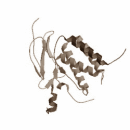|
Definition: "An ergogenic aid is any substance or phenomenon that enhances performance "
|
|
||||||||
05.04.2011 |
|
|
Half hour of moderately intensive cardio training boosts interleukin-15 release
Interleukin-15, a muscle-building signal protein manufactured by muscle cells, is also released during and after cardio exercise. Japanese researchers found an increased concentration of interleukin-15 in men who had cycled at moderate speed for 30 minutes. Their study will be published soon in Endocrine Journal.
It would seem to go without saying that interleukin is released during exertion, but researchers have not yet found any indication that confirms this theory in endurance athletes. The Japanese got 13 young men to run fast on a treadmill for half an hour at 70 percent of their maximal heartbeat.
The researchers monitored the concentration of interleukin-15 in the blood of their test subjects. They discovered that the concentration of interleukin quickly reaches a peak, but also recedes again quickly. An hour after the exertion, the rise in the level was no longer significant. And after three hours the difference had completely disappeared.
In 2004 sports scientists at the University of Pittsburgh published the results of a study in which they looked at the effects of strength training on the production of interleukin-15. [J Appl Physiol. 2004 Dec; 97(6): 2214-9.] They also observed a peak soon after the end of training that then disappears quickly. Nevertheless, the Americans describe interleukin-15 as "an important mediator of muscle phenotypes in humans".
Back to the Japanese. They conclude "strenuous high intensity training may not be necessary to significantly increase circulating IL-15 level". The intensity of half an hour of running at 70 percent of the maximal heartbeat is "considered within a range of moderate to submaximum intensity in untrained healthy adults".
Strength athletes can probably do themselves a big favour by adding a little cardio exercise to their workouts. According to epidemiological studies, muscle mass itself is actually a small risk factor for heart attacks [Int J Obes (Lond). 2011 Feb 1. [Epub ahead of print].], and both lab studies and epidemiological studies show that strength training reduces the elasticity of the blood vessels. A short cardio training session after a weight workout cancels out this effect.
The Japanese study suggests that short, non-intensive cardio sessions may do more than just wipe out the negative effect of strength training. Perhaps cardio enhances the effect of strength training via interleukin-15 on muscle build-up and fat mass breakdown.
Source:
More:
|
|



